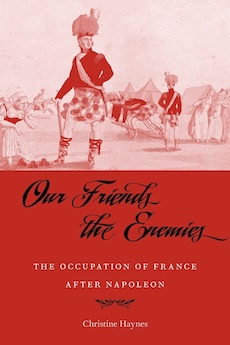By Benjamin Franklin Martin
When the Quadruple Alliance (Great Britain, Prussia, Austria, and Russia) defeated Napoleon Bonaparte in 1814, forcing his abdication and exile, they were prepared to be magnanimous toward a France against which they had warred for a quarter-century. When they defeated Bonaparte at Waterloo in 1815, they were determined to be vindictive toward a France that had, however half-heartedly, embraced the “usurper” again. What the Allies did do was neither irenic nor vengeful but instead practical: imposing an “occupation of guarantee” to cool political tempers and to end France’s status as a rogue state. Explaining this policy is the basis of Our Friends the Enemies, for which Christine Haynes (ΦBK, University of Michigan) has utilized an impressive collection of national, departmental, and municipal archives, as well as private correspondence, memoirs, and contemporary writings, plays, songs, and art work.
The terms of the occupation were brutal: the north and northeast of France occupied by 150,000 troops under the command of Arthur Wellesley, Duke of Wellington for up to five years or until the French government reimbursed the costs of the war and paid an indemnity of 700 million francs. During the interim, the French were responsible for the entire expense of the occupation, eventually totaling 2.4 billion francs. Converted to dollars today, those amounts are approximately $2.6 billion and $9 billion, respectively.
Inevitably, the occupation had the effect of “nourishing hatred” through depredations, intemperate demands, deliberate misunderstandings, sexual assaults, and stripping the Louvre Museum of treasures recently the prize of Napoleonic campaigns. Yet this “time to endure” also led to reconciliation because the bitter winter of 1816-1817 forced a sharing of burdens and because the many visitors to Paris created a cosmopolitan “Babel on the Seine.”
The restored Bourbon monarch, Louis XVIII, and his minister of foreign affairs, Armand-Emmanuel du Plessis, Duc de Richelieu, sought political stability with a balance between liberalism and reaction, accepting the gains of the French Revolution through 1789 and 1790, constitutional monarchy and destruction of the ancien régime. To pay the war costs and indemnity, Richelieu and the minister of finance, Comte Louis-Emmanuel de Corvetto, devised a complicated scheme combining taxes, bonds, borrowings, and a lottery. By the fall of 1818, France had so satisfied the Allies that at the conference of Aix-la-Chapelle they agreed to end the occupation of guarantee two years early, withdrawing their troops before the end of the year.
For Haynes, the pressure of the occupation meant that France experienced not merely a “restoration”—the traditional interpretation of this period—but a “regeneration”: “remaking political culture,” resolving financial issues dating from before the French Revolution, and reconciling with the other powers of Europe. Perhaps the Bourbons might have reestablished themselves thoroughly and avoided the revolution of 1830 if only Charles X, who rejected all the changes in France since 1789, had not succeeded to the throne in 1824.
Benjamin Franklin Martin (ΦΒΚ, Davidson College) is Price Professor of History Emeritus at Louisiana State University; his most recent book is Roger Martin du Gard and Maumort: The Nobel Laureate and His Unfinished Creation (Northern Illinois University Press, 2017).




